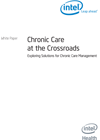 The World Health Organization reports that chronic disease is responsible for 60% of all deaths worldwide. In the UK, 17.5 million people are living with chronic illness, and among people over 75 years of age, three-quarters have at least one chronic disease. Chronic illness is challenging for patients because they often have to make significant changes in their social and family relationships while dealing with physical pain, prolonged medical treatment, psychological distress and growing restrictions on their daily activities. As a result, their quality of life is significantly reduced.
The World Health Organization reports that chronic disease is responsible for 60% of all deaths worldwide. In the UK, 17.5 million people are living with chronic illness, and among people over 75 years of age, three-quarters have at least one chronic disease. Chronic illness is challenging for patients because they often have to make significant changes in their social and family relationships while dealing with physical pain, prolonged medical treatment, psychological distress and growing restrictions on their daily activities. As a result, their quality of life is significantly reduced. Quality of life among people who provide care to chronically ill family members is also affected. Carers face an increased financial, physical and emotional responsibility. Some carers who are employed report missing work, taking personal days off, or even retiring early to provide care. Since many patients are also faced with stopping work, chronic illness frequently leads to economic hardship for patients and their families.
The economic burden to healthcare systems is also significant; in the UK 80% of GP consultations relate to chronic illness and 60% of hospital bed days result from chronic illness and related complications. As the population ages and the number of people affected by chronic disease grows, the demand for healthcare resources will escalate. The number of people aged 50 years and over in the UK is projected to increase by 36% by 2031, while the number of people over 85 years will increase by 44%. These demands will have important implications for governments as they address the challenge of sustaining an equitable healthcare system.
The Chronic Care at the Crossroads summit, hosted by Intel Corporation in July 2007, was convened to debate these issues. Jeremy Vine, the BBC broadcaster, moderated three panel discussions that brought together 10 healthcare experts, including representatives from NHS Connecting for Health, The Research Institute for the Care of the Elderly (RICE), and the UK eHealth Association. The summit gave participants a forum to discuss ways of improving patient care and easing the strain on healthcare professionals, families and the NHS.
Download Chronic Care at the Crossroads White Paper (.pdf, 121KB)
Download from the eHealthNews.EU Portal's mirror: Chronic Care at the Crossroads White Paper (.pdf, 121KB)
For further information, please visit:
http://www.intel.com/healthcare/